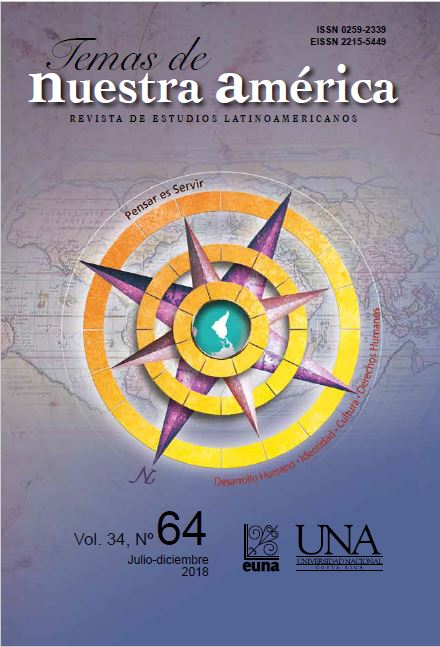Political Systems in Central America. A Compared Historical Analysis
DOI:
https://doi.org/10.15359/tdna.34-64.6Keywords:
Central America, Political Systems, Compared Historical Study, Democratization, POlitical Liberalization, Quiality Of DemocracyAbstract
This study aims to compare the political systems in Central America from a historical perspective. Here, Central America is considered as a very diverse region in experiences and quality of democracy; Costa Rica is the most successful, historical, contemporary case in the subregion. In the rest of the countries, there are relatively young and fragile democracies, without historical experiences of democracy, with very weak States, without social consensus, and with limited citizenship that is treated in a clientelist manner and is a victim of poverty and inequality.
References
Alfaro, Ronald y Gómez, Steffan (2016). “Costa Rica: Fuerte interdependencia entre actores genera un contexto de parálisis y enfrentamiento político” [Costa Rica: Strong Interdependence Between Actors Generates a Context of Paralysis and Political Confrontation]. In: Revista de ciencia política, 36, 1, 2016, 103-121
Alfaro, Ronald y Gómez, Steffan (2014). “Costa Rica: Elecciones en el contexto político más adverso arrojan la mayor fragmentación partidaria en 60 años” [Costa Rica: Elections in the Most Adverse Political Context Provoke the Greater Parties Frag¬mentation in 60 Years]. In: Revista de ciencia política, 34, 1, 2014, 125-144
Alfaro, Ronald y Gómez, Steffan (2012). “Costa Rica: Reconfiguración política en un contexto de gobierno dividido” [Costa Rica: Political Reconfiguration in the Context of a Divided Government]. In: Revista de ciencia política, 32, 1, 2012, 109-128
Anderson, Leslie y Dodd, Lawrence (2009). “Nicaragua: Progress amid Regress?”. In: Journal of Democracy, 20, 3, 2009, 153-167
Azpuru, Dinorah y Blanco, Ligia (2008). “Guatemala 2007: un año de contrastes para la democracia” [Guatemala 2007: A Year of Contrasts for Democracy]. In: Revista de ciencia política, 28, 1, 2008, 217-244
Bendel, Petra y Krennerich, Michael (2005). “Guatemala”. In: Dieter Nohlen (Ed.) Elections in the Americas a Data Hand¬book. Volume I: North America, Central America, and the Caribbean. Oxford University Press. Oxford, Inglaterra.
Bendel, Petra, Krennerich, Michael y Zi¬lla, Claudia (2005). “Panamá”. In: Dieter Nohlen (Ed.) Elections in the Americas a Data Handbook. Volume I: North America, Central America, and the Caribbean. Oxford University Press. Oxford, Inglaterra.
Brown, Harry y Luna, Clara (2013). “Panamá: el crecimiento económico a expensas de la política” [Panama: Economic Growth at the Expense of Politics]. In: Revista de ciencia política, 33, 1, 2013, 287-301
Camacho, Daniel (1983). “Costa Rica: la estabilidad del ojo de la tormenta” [Costa Rica: The Stability in the Eye of the Storm]. In: Nueva sociedad, 67, julio-agosto 1983, 8-12
Cajina, Roberto y Lacayo, Walter (1999). “Nicaragua. Imposición bipartidista y desencanto político” [Nicaragua. The Bipartisan Imposition and Poli¬tical Disenchantment]. In: Nueva sociedad, 164, julio-agosto 1999, 26-33
Colburn, Forrest y Cruz, Arturo (2012). “Personalism and Populism in Nicaragua”. In: Journal of Democracy, 23, 2, 2009, 143-152
Colburn, Forrest (2009). “The Turnover in El Salvador”. In: Journal of Democra-cy, 20, 3, 2009, 143-152
Feoli, Ludovico (2009). “Costa Rica después del TLC: ¿la calma que sigue a la tempestad?” [Costa Rica After CAFTA: Calm After the Storm?]. In: Revista de ciencia política, 29, 2, 2009, 355-379104
Guevara, Carlos (2016). “Panamá: Luces y sombras en torno a la institucionalidad democrática” [Panama: Lights and Shadows Around the Democratic Institutionality]. In: Revista de ciencia política, 36, 1, 2016, 259-285
Hernández, Gerardo (2011). “Partidos políticos y calidad de la democracia en un contexto de cambios en el sistema de partidos de Costa Rica” [Political Parties and the Quality of Democracy in a Context of Changes in the Party System of Costa Rica]. In: Anuario del centro de investigaciones y estudios políticos, 2, 2011, 124-147.
Krennerich, Michael (2005a). “El Salvador”. In: Dieter Nohlen (Ed.) Elections in the Americas a Data Handbook. Volume I: North America, Central America, and the Caribbean. Oxford University Press. Oxford, Inglaterra.
Krennerich, Michael (2005b). “Nicaragua”. En: Dieter Nohlen (Ed.) Elections in the Americas a Data Handbook. Volume I: North America, Central America, and the Caribbean. Oxford University Press. Oxford, Inglaterra.
Luna, Clara y Sánchez, Salvador (2009). “Panamá: paraíso imperfecto” [Panama: Imperfect Paradise]. In: Revista de ciencia política, 33, 1, 2009, 533-564
Mainwaring, Scott y Pérez-Liñán, Aníbal (2016). “La democracia a la deriva en América Latina” [Democracy in La¬tin America Left Adrift]. In: POStData, 20, 2, Octubre/2015-Marzo/2016, 267-294
Mainwaring, Scott y Pérez-Liñán, Aníbal (2005). “Latin American Democratization since 1978: Democratic Transitions, Breakdowns, and Ero¬sions”. In: Frances Hagopian y Scott Mainwaring (Eds.) The Third Wave of Democratization in Latin America. Cambridge University Press. Cambridge, Inglaterra.
Mainwaring, Scott y Scully, Timothy (1997). “La institucionalización de los sistemas de partido en la América Latina” [The Institutionalization of Party Systems in Latin America]. In: América Latina hoy, 16, agosto 1997, 91-108
Martí I Puig, Salvador (2016). “Nicaragua: Desdemocratización y caudillismo” [Nicaragua: Dedemocratization and Caudillismo]. In: Revista de ciencia po-lítica, 36, 1, 2016, 239-258
Martí I Puig, Salvador (2013). “Nicaragua: la consolidación de un régimen híbrido” [Nicaragua: The Consolidation of a Hybrid Regime]. In: Re¬vista de ciencia política, 33, 1, 2013, 269-286
Martí I Puig, Salvador (2009). “Nicaragua 2008: polarización y pactos” [Nica-ragua 2008: Polarization and Agreements]. In: Revista de ciencia política, 29, 2, 2009, 515-531
Martí I Puig, Salvador (2008). “El regreso de Ortega: los primeros pasos de su se¬gunda administración” [The Return of Ortega: The First Steps of His Second Administration]. In: Revista de ciencia política, 28, 1, 2008, 287-303
Morlino, Leonardo (2014). La calidad de las democracias en América Latina [The Quality of Democracies in Latin America]. Instituto Internacional para la Democracia y la Asistencia Electoral. San José, Costa Rica.105
Nasi, Carlo (1990). “Panamá: Crisis, invasión y la nueva era de hegemonía norteamericana” [Panama: Crisis, Invasion, and the New Era of American Hegemony]. In: Colombia Internacional, 9, 1990, 13-24
Ortega, Manuel (1997). “Nicaragua. ¿Un nuevo bipartidismo?” [Nicaragua: New Bipartisanship?]. In: Nueva sociedad, 164, enero-febrero 1997, 6-11
Pérez, Andrés (2012). “Nicaragua: Democracia electoral sin consenso social” [Nicaragua: Electoral Democracy Without Social Consensus]. In: Re¬vista de ciencia política, 32, 1, 2012, 211-228
Prieto, Marcelo (1979). “Militarismo y democracia en Costa Rica” [Militarism and Democracy in Costa Rica]. In: Nueva sociedad, 42, mayo-junio 1979, 119-130
Ramos, Carlos, Loya, Nayelly y Arteaga, Erika (2009). “El Salvador: Entre el continuismo y la desilusión” [El Sal¬vador: Between the Continuism and Disappointment]. In: Revista de ciencia política, 29, 2, 2009, 407-421
Reina, José (1981). “Honduras: ¿revolución pacífica o violenta?” [Honduras: Peaceful or Violent Revolution?]. In: Nueva sociedad, 52, enero-febrero 1981, 35-56
Rocha, José (2010). “Crisis institucional en Nicaragua: entre un Estado privatizdo y un Estado monarquizado” [Institutional Crisis in Nicaragua: Between a Privatized State and a State With Monarchical Characteristics]. In: Nueva sociedad, 228, julio-agosto 2010, 4-13
Roody, Réserve (2016). “El Salvador: Un año político y social convulso” [El Salvador: A Politically and Socially Convulsive Year]. In: Revista de ciencia política, 36, 1, 2016, 177-194
Roody, Réserve (2012). “El Salvador: Entre el continuismo y la desilusión” [El Salvador: Between the Continuism and Disappointment]. In: Revista de ciencia política, 32, 1, 2012, 151-169
Rojas, Manuel (2010). “Centroamérica: ¿anomalías o realidades?” [Central America: Anomalies or Realities?]. In: Nueva sociedad, 226, marzo-abril 2010, 100-114
Ruhl, Mark (2010). “Honduras Unravels”. In: Journal of Democracy, 21, 2, 2010, 93-107
Salomón, Leticia (1996). “Honduras, los retos de la democracia” [Honduras, the Challenges of Democracy]. In: Nueva sociedad, 141, enero-febrero 1979, 10-14
Seligson, Mitchell (2005). “Democracy on Ice the Multiple Challenges of Guatemala’s Peace Process”. In: Frances Hagopian y Scott Mainwaring (Eds.) The Third Wave of Democratization in Latin America. Cambridge University Press. Cambridge, Inglaterra.
Somoza, Alexander (2005). “Honduras”. In: Dieter Nohlen (Ed.) Elections in the Americas a Data Handbook. Volume I: North America, Central America, and the Caribbean. Oxford University Press. Oxford, Inglaterra.
Sosa, José (2014). “Honduras: Entre crimi¬nalidad, enfrentamiento mediático, protesta social y resultados elec¬torales cuestionados” [Honduras: 106 Between Criminality, Media Confrontation, Social Protest, and Election Results Called Into Question]. In: Revista de ciencia política, 34, 1, 2014, 203-219
Taylor, Michelle (2009). “Honduras: una mezcla de cambio y continuidad” [Honduras: A Mixture of Change and Continuity]. In: Revista de ciencia política, 29, 2, 2009, 471-489
Torres, Edelberto (2015). Centroamérica: entre revoluciones y democracia [Central America: Between Revolutions and Democracy]. Siglo XXI Editores/ CLACSO, Buenos Aires, Argentina.
Torres, Edelberto (2010). “Las democracias malas de Centroamérica” [Bad Democracies in Central America]. In: Nueva sociedad, 226, julio-agosto 2010, 52-66
Torres, Edelberto (1997). “Centroamérica. Revoluciones sin cambio revolucionario” [Central America: Revo¬lutions Without a Revolutionary Change]. In: Nueva sociedad, 150, julio-agosto 1997, 84-89
Torres, Edelberto (1996). “La gobernabilidad Centroamericana en los noventa. Consideraciones sobre las posibilidades democráticas en la postguerra” [The Central American Governance in the 1990s. Considerations on the Democratic Potential in the Postwar Era]. In: América Latina hoy, 49, 1996, 17-31
Torres, Edelberto (1993). History and Society in Central America. Texas University Press. Texas, Unite State.
Torres, Edelberto (1981). “Problemas de la contarrevolución y la democracia en Guatemala” [Problems of the Coun¬ter-Revolution and Democracy in Guatemala]. In: Nueva sociedad, 53, marzo-abril 1981, 97-112
Turcios, Roberto (1997). “El Salvador. una transición histórica y fundacional” [El Salvador: A Historic and Foundational Transition]. In: Nueva socie¬dad, 150, julio-agosto 1997, 112-118
Vargas, Oscar (1995). “Nicaragua. Peligra la consolidación democrática” [Nicaragua: The Democratic Consolidation in Danger]. In: Nueva sociedad, 137, mayo-junio 1995, 6-10
Wood, Elisabeth (2005). “Challenges to Political Democracy in El Salvador”. In: Frances Hagopian y Scott Mainwaring (Eds.) The Third Wave of Democratization in Latin America. Cambridge University Press. Cambridge, Inglaterra.
Zovatto, Daniel (2005). “Costa Rica”. In: Dieter Nohlen (Ed.) Elections in the Americas a Data Handbook. Volume I: North America, Central America, and the Caribbean. Oxford University Press. Oxford, Inglaterra
Downloads
Published
How to Cite
Issue
Section
License
Esta obra de Revista Temas de Nuestra América está bajo una Licencia Creative Commons Atribución-NoComercial-SinDerivar 4.0 Internacional.
Cualquier permiso que trascienda dicha licencia, debe solicitarse por escrito a la persona directora de la Revista










